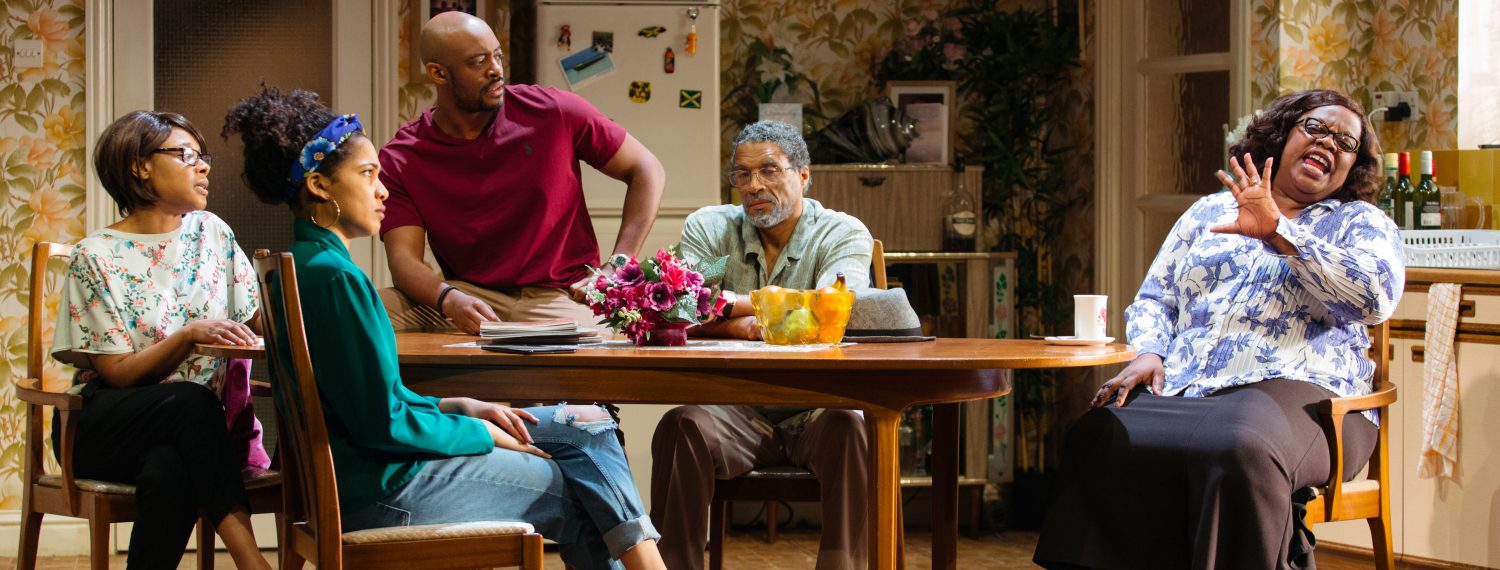With its ability to both move and make the audience laugh, this new play from Natasha Gordon puts a new spin on the traditional themes of grief and loss. Anthony Walker-Cook examines this new production, focusing on its Jamaican wit and praising Cecilia Noble as the indomitable Aunt Maggie.
In this astonishingly funny authorial debut from Natasha Gordon, Nine Night depicts the common themes of loss, grief and family through the lens of the Jamaican nine night tradition. In his programme essay ‘The Living and the Dead’, Paul H Williams accounts ‘The nine night was […] the most elaborate and poignant of the set-ups, a mass gathering to offer emotional support to the bereaved, to pay respect to the deceased, and to formally bid him or her farewell.’ Gordon’s new play transposes this celebration to contemporary England and, with Gloria recently deceased, three generations gather to plan her funeral. Held at the National’s Dorfman, director Roy Alexander Weise’s production is both intensely humorous and surprisingly moving. Also about racial identity and generational change, Nine Night feels all the more pertinent given the recent political turmoil surrounding the Windrush Generation, elevating the play’s undeniable comedy into a story that all audiences can celebrate and learn from.
The entire play is set in Gloria’s home where her daughter Lorraine (Franc Ashman) cared for her during her battle with cancer. Rajha Shakiry’s set focuses on Gloria’s living room and though she is unseen her presence is felt. The interior is simple: a couch and dining table and chairs occupy the majority of the stage’s space whilst steps leading upstairs are at the back. Doors lead off to the hallway, another room where the wake is held and a garden. From the colourful wallpaper to characters lovingly looking at her picture that faces the audience, Gloria is as much as character as those embodied on stage. Her family imagine her sitting at the dinner table, remember the daily rituals she had with her children and, with her passing, they are now unable to tidy her bedroom or wash her bedsheets since they still smell of her. In these touches, Gordon intimately stages the signs of loss, aided by the Dorfman’s intimate theatre.

From Gloria’s immediate death through to the final night of the nine night celebration, the family through the inevitable series of emotions: guilt, grief and anger among others. A play primarily about family and grief, there are multiple mother-daughter relationships throughout: Gloria to Lorraine and Trudy (Michelle Greenidge), Lorraine and Anita (Rebekah Murrell), and Anita and her young baby. Having cared for her mother with cancer, and who has to now organise the funeral celebrations, Ashman brings a wounded dignity to her role. As her formidable daughter Murrell continues the line of strong, independent women and, though at first she finds the nine night celebration frustrating and draining, by the end she reconciles her Jamaican heritage and British sensibility. Oliver Alvin-Wilson is Robert, Lorraine’s brother, whose tough exterior proves a façade if one simply looks into his often-glistening eyes, and as his older sister Trudy, Greenidge’s energy lifts the show as it goes into its second half with her suitcase full of gifts. Robert’s wife Sophie is played by Hattie Ladbury who, cast off by her racist mother, brings another variation to the theme of mother-daughter relationships in more ways than one. Ricky Fearon as Uncle Vince offers an at-times calm voice as well as a surprising softness, often murmuring his responses to his wife. It is little surprise, however, that his voice has been drowned out after a long marriage to Aunt Maggie, played superbly by Cecilia Noble. With sharp, worldly Jamaican humour, Noble’s comedic timing makes her performance the play’s the standout, a living testimony to the impressive presence of the family’s matriarch.

Nine Nights reminds us of both the sadness and comedy that comes with grief and remembering a person’s life. My only complaint is that the play is not long enough: just as the full emotional heft of the childrens’ grief is realised, profoundly replacing the vibrant comedy of before, the play ends. At a time when cultural ignorance seems rife, Nine Night teaches audiences the importance of love and family; the play channels the audience’s laughter and knows exactly when to strip back and remove this exterior, and the consequent result is an electric atmosphere both on stage and in the audience. This new and vibrant play deserves to be well received by critics and audiences, for it tells a similar story from a new lens. Immediately succeeding The Great Wave, hopefully the National Theatre will continue to tell of different cultures and make it worthy of its name for a multicultural Britain. If you can, book a ticket to Nine Night and celebrate Gloria’s life with her family: it’s an experience you will not forget soon.
Nine Night is playing in the National’s Dorfman Theatre until 26th May, 2018.














